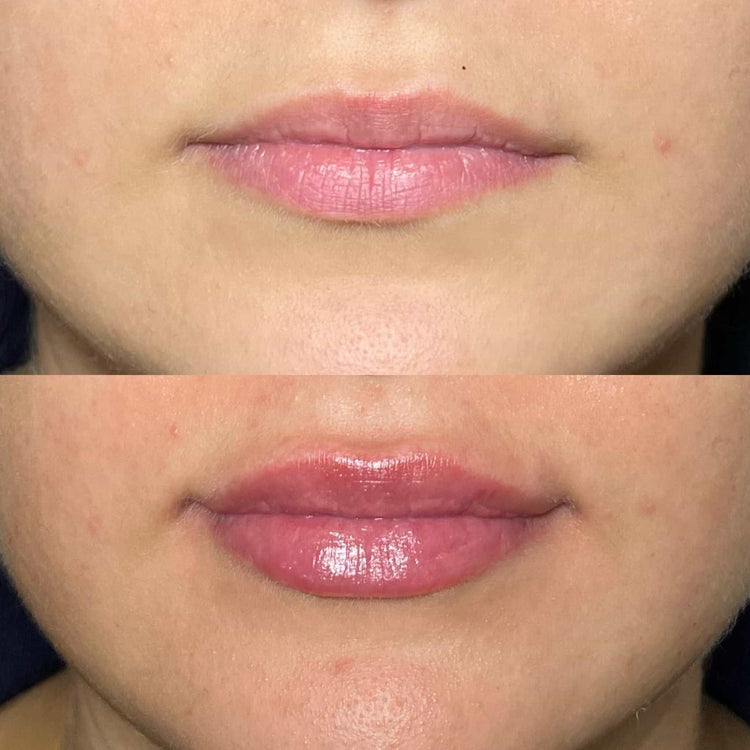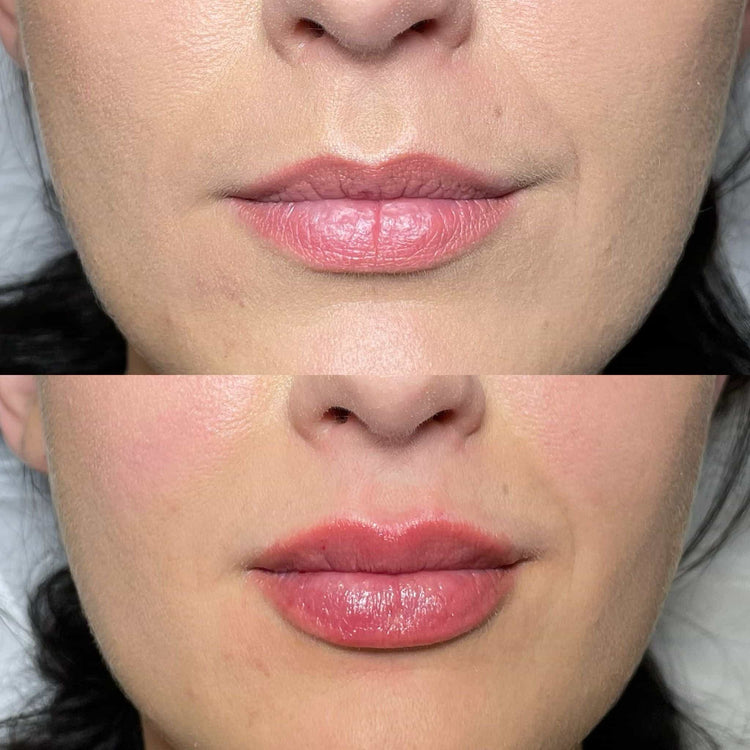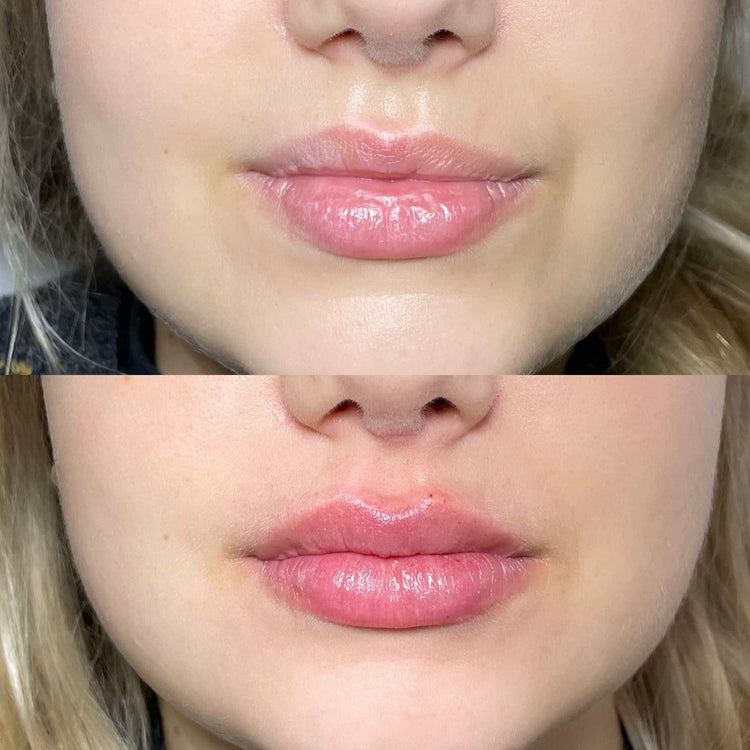Risks and Side Effects
Before making any decisions about cosmetic procedures, it’s crucial to understand the potential risks and side effects involved. Lip fillers, while popular, are not without their potential downsides. From temporary swelling and bruising to more serious complications like infection or allergic reactions, it’s important to weigh the benefits against the possible risks, especially for young people whose bodies are still developing.
Temporary Side Effects
Temporary side effects from lip fillers are common and usually subside within a few days. These include swelling, redness, tenderness, and bruising around the injection site. It’s normal to experience some discomfort and stiffness, which can be managed with ice packs and over-the-counter pain relievers.
Long-Term Complications
Long-term complications are less common but still possible. These can include persistent swelling or lumps (granulomas), migration of the filler, asymmetry, and scarring. In rare cases, there’s a risk of vascular occlusion, where the filler blocks blood flow to the lips, which can be life-threatening if not treated promptly.
The developing nature of teenagers’ bodies adds another layer of complexity. Their faces are still changing, making it harder to predict how fillers will settle and integrate over time. There’s also a higher risk of complications due to immature immune systems.
Legal Considerations in the UK
The use of cosmetic procedures like lip fillers among teenagers in the UK is a topic of ongoing debate. While regulations exist to safeguard individuals, navigating the legal landscape surrounding cosmetic treatments for minors can be complex.
Age Restrictions for Procedures
In the UK, specific legislation concerning age restrictions for cosmetic procedures like lip fillers is not explicitly defined.
The General Medical Council (GMC) provides guidance for medical practitioners, emphasizing the importance of considering the patient’s best interests and ensuring their consent. For minors, this involves parental or guardian consent in addition to the minor’s own understanding and agreement.
While lip fillers are generally not considered medically necessary, some exceptions may apply. For instance, if a procedure is deemed essential for reconstructive purposes following an injury, it might be permissible.
The GMC guidelines emphasize thorough assessment, including counseling on risks and benefits, tailored to the individual’s maturity and understanding. Ethical considerations play a crucial role, with practitioners urged to prioritize patient well-being over commercial interests.
Ethical Concerns
Navigating the legality of lip fillers for teenagers in the UK is complex as there isn’t explicit legislation dictating age restrictions for such procedures.

However, the General Medical Council (GMC) provides crucial guidance for medical practitioners.
- The GMC emphasizes that practitioners must prioritize the patient’s best interests and ensure their informed consent.
- For minors, this means obtaining both parental or guardian consent and ensuring the minor understands and agrees to the procedure.
- While lip fillers are generally considered cosmetic rather than medically necessary, exceptions exist for reconstructive purposes following an injury.
- Practitioners are urged to conduct thorough assessments, providing counseling on risks and benefits tailored to the individual’s maturity level.
Ethical considerations are paramount. Practitioners are encouraged to prioritize patient well-being over potential commercial gains.
Regulatory Oversight and Standards
The use of cosmetic procedures like lip fillers among teenagers in the UK is a topic of ongoing debate. While regulations exist to safeguard individuals, navigating the legal landscape surrounding cosmetic treatments for minors can be complex.
Safety Regulations for Clinics and Practitioners

Regulatory oversight and standards play a crucial role in ensuring the safety of cosmetic procedures, particularly for vulnerable populations like teenagers. In the UK, while there isn’t specific legislation dictating age restrictions for lip fillers, the General Medical Council (GMC) provides essential guidance for practitioners.
The GMC emphasizes that practitioners must prioritize the patient’s best interests and obtain informed consent. For minors, this means securing both parental or guardian consent and ensuring the minor understands the risks and benefits involved.
Ethical considerations are paramount in this context. Practitioners are urged to carefully assess a teenager’s maturity level and ensure they fully comprehend the implications of lip fillers before proceeding with the procedure.
Safety regulations for clinics and practitioners focus on maintaining sterile environments, using approved products, and employing trained professionals. Regular inspections and audits help enforce these standards.
It is important to note that while lip fillers are generally considered cosmetic rather than medically necessary, exceptions may exist for reconstructive purposes following an injury.
Product Approval Processes
Regulatory oversight and standards are essential in ensuring the safety of cosmetic procedures, especially for vulnerable populations like teenagers. In the UK, although there isn’t specific legislation setting age limits for lip fillers, the General Medical Council (GMC) provides crucial guidance for practitioners.
The GMC emphasizes that practitioners must prioritize patient well-being and obtain informed consent. For minors, this involves securing both parental or guardian consent and ensuring the minor understands the procedure’s risks and benefits. Ethical considerations are paramount, urging practitioners to carefully assess a teenager’s maturity level and ensure they fully grasp the implications of lip fillers before proceeding.
Product approval processes in the UK involve rigorous testing and evaluation by regulatory bodies such as the Medicines and Healthcare products Regulatory Agency (MHRA). Fillers must demonstrate safety and efficacy before being made available for use.
Safety regulations for clinics and practitioners focus on maintaining sterile environments, using approved products, and employing trained professionals. Regular inspections and audits help enforce these standards.
Parental Consent and Communication
Parental consent and communication are crucial when considering cosmetic procedures like lip fillers for teenagers in the UK. While specific legislation regarding age restrictions for such procedures doesn’t exist, the General Medical Council (GMC) provides essential guidance for practitioners.
The GMC emphasizes that practitioners must prioritize a minor’s best interests and obtain informed consent from both the teenager and their parent or guardian. This involves ensuring the teenager fully understands the risks and benefits involved, considering their maturity level and providing tailored counseling.
The Role of Parents in Decision-Making
Parental consent and communication are crucial when considering cosmetic procedures like lip fillers for teenagers in the UK. While specific legislation regarding age restrictions for such procedures doesn’t exist, the General Medical Council (GMC) provides essential guidance for practitioners.
The GMC emphasizes that practitioners must prioritize a minor’s best interests and obtain informed consent from both the teenager and their parent or guardian. This involves ensuring the teenager fully understands the risks and benefits involved, considering their maturity level and providing tailored counseling.
- Parents should be actively involved in the decision-making process regarding their child’s cosmetic procedures.
- Open and honest communication between parents, teenagers, and practitioners is essential to ensure everyone is informed and comfortable with the decision.
- Parents need to understand the potential risks and side effects of lip fillers, as well as the long-term implications for their child’s health and appearance.
The GMC also stresses the importance of ethical considerations. Practitioners should prioritize patient well-being over commercial interests and avoid pressuring teenagers into undergoing procedures they may not be fully prepared for.
Open Dialogue Between Teenagers and Parents
Parental consent and open communication are paramount when it comes to teenagers considering cosmetic procedures like lip fillers. While the UK doesn’t have specific legislation dictating age limits for such procedures, the General Medical Council (GMC) provides crucial guidance for practitioners.

The GMC emphasizes that informed consent is essential, involving both parental or guardian consent and the teenager’s understanding of the risks and benefits involved. This requires open dialogue where parents can discuss their concerns with their children, and practitioners can provide tailored counseling considering the teenager’s maturity level.
Parents play a vital role in guiding their teenagers through this decision-making process. They should encourage honest conversations, address any anxieties, and ensure their child feels comfortable asking questions. Parents need to be well-informed about the potential risks and side effects of lip fillers, as well as the long-term implications for their child’s health and appearance.
Ultimately, the decision to undergo lip fillers should be a collaborative one made with careful consideration, open communication, and a focus on the teenager’s best interests.
Alternative Solutions
The use of cosmetic procedures like lip fillers among teenagers in the UK is a complex and evolving issue. While regulations exist to protect individuals, navigating the legal landscape surrounding cosmetic treatments for minors can be challenging.
Non-Invasive Beauty Treatments
Exploring alternative solutions to lip fillers for teenagers can be beneficial. These alternatives often focus on enhancing natural beauty without resorting to injections.
- Lip plumping products: Over-the-counter balms, glosses, and serums containing ingredients like hyaluronic acid or volumizing peptides can temporarily increase lip fullness.
- Facial exercises: Certain facial exercises, though their effectiveness is debated, are said to strengthen the muscles around the lips, potentially enhancing their appearance over time.
- Makeup techniques: Contouring and highlighting using makeup can create the illusion of fuller lips.
- Healthy lifestyle choices: Eating a balanced diet, staying hydrated, and managing stress can improve overall skin health and contribute to plumper-looking lips.
It’s essential for teenagers considering lip enhancements to have open conversations with their parents and healthcare providers. Weighing the potential risks and benefits of any procedure, including alternatives, is crucial for making informed decisions about their appearance and well-being.
Transform your smile, book lip fillers with Dr. Laura Geige at It’s Me & You Clinic
- Baby Botox Treatments Near Wrecclesham, Surrey - May 14, 2025
- Skin Injectables Near Thorpe, Surrey - May 14, 2025
- How Nasolabial Fold Fillers Help With Facial Aging In London - May 13, 2025
